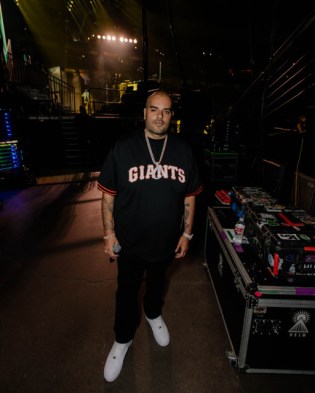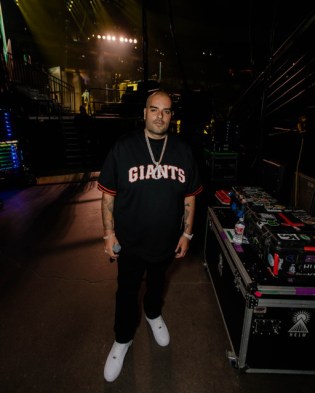This post was originally published on this site
By summer 2021, Gilbert Milam Jr. was living a good life. A nationally renowned rapper who performs under the name Berner, Milam was also enjoying the global expansion of Cookies, a brand of cannabis products and clothing that he co-founded and was running as CEO.
But Milam was haunted by a family history of cancer, including his mother’s death from stomach cancer at 54. So, at age 37, he told his physician in San Francisco that he wanted to take every precaution against being diagnosed too late to live a full life. As it happened, his doctor said there was a new test to try.
The blood test, Galleri, returned a DNA signal for colon cancer. After a colonoscopy confirmed it was stage 3, Milam underwent eight hours of surgery, followed by radiation and chemotherapy. Today, he said, he is cancer-free.
“That test saved my life, and that’s a fact,” said Milam, speaking with California Healthline from his tour bus in July.

Galleri, priced at $949, is the first of a wave of so-called multi-cancer early-detection (MCED) tests, which analyze DNA fragments in the blood for abnormalities associated with cancer. Grail, the Menlo Park-based biotech company that created Galleri, says it checks more than a million specific DNA sites for cancer signals and can identify more than 50 types of cancer, including cervical, colon, breast, and prostate. More than a dozen prospective rivals are developing their own cancer-screening products.
The medical community, however, has yet to come to a consensus on the value of MCED tests. The notion of broadly screening seemingly healthy people has raised alarms among those who already lament the American medical system’s penchant for overtesting and, often, overtreating patients based on test results. Some note the controversy around prostate-specific antigen tests for prostate cancer as an example.
“A screening test has to be magnificent, mathematically, for it to be beneficial,” said Jerome Hoffman, a professor emeritus at UCLA’s Department of Medicine and a longtime critic of overtesting and overdiagnosis. “The biggest threat on the horizon is overdiagnosis — finding things that don’t matter but that we intervene on anyway.”
Many experts say it isn’t yet clear whether the tests do more good than harm — and having one already commercially available troubles them.
“You interview a hundred people and tell them there’s a test that could detect 20 or 30 or 50 cancers with a single blood sample, and a whole lot of them are going to say, ‘I want that,’” said Philip Castle, cancer prevention director at the National Cancer Institute. “But this is a brave new world. We don’t know anything about these tests, truly.”
Milam’s journey began in San Francisco when he was having blood drawn to check for covid-19 antibodies. He told his doctor, Jordan Shlain, about his fear of developing life-threatening cancer, and about his family’s history with the disease.
Shlain, founder of the San Francisco-based concierge practice Private Medical, told Milam about Galleri.
“Our practice had done a 12- to 18-month review of the science. We grilled the people at Grail,” said Shlain. “The short version is, new test, promising results, and we know that genetics and genomics have transformed the way cancer is treated. You have to be skeptical if you’re a scientist, but this is also a tension between policymakers and primary care doctors. I take care of individuals, not populations.”
Shlain said he doesn’t recommend the test for all patients; it would depend on their histories and risk factors. On the other hand, he said, “You can’t prevent cancer, but you can prevent it from killing you by catching it early. That’s just a truism.”
Milam, who continues to both perform and run Cookies (the company has been the subject of recent lawsuits), has become an evangelist for the test. He has often discussed his experience with his more than 2 million Instagram followers, and he wonders why more doctors don’t prescribe Galleri as they would standard screenings. Shlain said even some doctors in his practice are reluctant, despite Private Medical’s deep dive into the research.
Grail’s path has not been smooth. The company was originally a spinoff of San Diego gene-sequencing pioneer Illumina, and after the firm raised venture funding and proved its technology, Illumina bought it back last year for $7.1 billion. But because Illumina dominates the market for the sequencers needed in MCED testing, the Federal Trade Commission has sued to unwind the deal on antitrust grounds.
Grail also acknowledged in June that about 400 of its customers were mistakenly told they might have cancer — not because of an error with the test, but because incorrect form letters were inadvertently sent out by a vendor.
Josh Ofman, Grail’s president, said the company is lobbying Congress “along with many constituent groups” to authorize Medicare to cover the cost of MCED tests, which could unlock billions of federal dollars in potential revenue. Grail recommends annual screening, but it’s generally not covered by insurers.
Said Castle, speaking of MCED tests in general, “I can’t remember seeing anything [in laboratory tests] that compares with the potential market of this. This is the kind of money being thrown around that we usually reserve for pharma.”
Grail used an exemption for laboratory-developed tests to begin marketing Galleri without FDA approval two years ago, a move that raised eyebrows in the medical community because that process is typically used for tests with no commercial value. Another MCED blood test, by Exact Sciences, is following the same path to market and is expected to be available soon.
“I’m going to guess that we’ll see more and more of that because companies are eager to start selling,” said Barnett Kramer, a former director of cancer prevention at the NCI and a member of the Lisa Schwartz Foundation for Truth in Medicine. “But that sometimes comes before the actual proof of a benefit — and I think that’s the case here.”
Detailed studies on the net benefit of MCED tests could take 10 to 15 years, Castle said. The FDA doesn’t have to wait for a large-scale federal study to be completed, but it could still be years before the agency approves any MCED test.
The aim of a longer, large-scale study is to better understand both the benefits and risks associated with early-cancer screening. Among other considerations: Many types of the disease lack treatments, and not all cancers grow significantly or ever become a problem. Skeptics of MCED tests worry about patients being diagnosed and treated — sometimes intrusively and with potential dangers — based on a finding that isn’t a true threat.
“It’s not enough to say you find cancer,” Castle said. “The question is, can we find cancer and save lives? We also want to know about the harms associated with this — false negatives and false positives — and whether the test works equally well in all populations.”
Ofman said Galleri has been the subject of multiple small-scale tests, including a study led by University of Oxford researchers that found a 76% positive predictive value — the probability that a patient with an abnormal test result actually has cancer. The study was supported by the United Kingdom’s National Health Service, which has undertaken a randomized clinical trial of the test that will ultimately involve 140,000 adults. Early results are expected next year.
Currently, established tests screen for only a handful of cancers — and those generally identify cancer in its later stages, when less can be done to intervene. According to NCI research, 73% of people who die of cancer had cancers that weren’t detected by the standard tests in use.
“You have more treatment options for cancers that are found early, sometimes including ones that are curative,” Ofman said. “And even with stage 3 or 4 cancers, treatments when the cancers are found asymptomatically get better outcomes.”
But with more than 100,000 Galleri tests already sold, Kramer, with the Foundation for Truth in Medicine, is among those concerned that the marketing of the product is running ahead of evidence in its favor.
“The weight of ethical burden shifts to the person who is trying to get the healthy person to take the test,” Kramer said. “The best-case scenario here is that the test might actually reduce the risk of dying from the second-most common cause of death in the adult population, and if it did that with a low risk of overdiagnosis, that would be a major win. But we’re a long way from being able to say that.”
